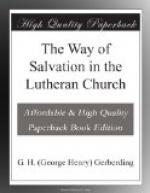We should notice here a distinction between those, who have at some time been under divine influence, as by virtue of the sacramental Word in baptism, or the written or preached Word, and those who have never been touched by a breath from above. When the Spirit of God comes to the former, He finds something still to appeal to. There is more or less receptivity to receive the Grace of God, as there is more or less life still in the germ formerly implanted. When He comes to the latter class there is nothing to work on. The foundations must be laid. A receptivity must be brought about, a new life must be inbreathed. In other words, in the conversion of the latter the Holy Spirit must do what He has already done in the former. The one is the conversion of a once regenerate but now lapsed one. The other is the regeneration and conversion of one heretofore always dead in sin.
But in every case, God comes first to the sinner; whether it be in the sacramental, or the written and preached Word. It is always through that Word, as we have already shown, that the Spirit of God operates on the sinful heart, enkindling penitence and begetting faith in Christ.
Now, what part does the will perform in this great work? Is it entirely passive, merely wrought upon, as the stone by the sculptor? At first, the will is doubtless entirely passive. The first movements, the first desires, the first serious thoughts, are beyond question produced by the Spirit, through the Word. These are the advance signals and heralds of Grace. They are the preparatory steps, and hence these first approaches of divine influence are called by theologians Prevenient Grace, that is the divine influence of Grace which precedes or goes before all other movements in the return of the soul to God.
This preparatory Grace comes to the sinner unsought, and is so far unavoidable. It is purely and entirely the work of the Holy Spirit upon the sinner. The human will has nothing whatever to do with the first beginnings of conversion. Of this our Confessions testify: “God must first come to us.” “Man’s will hath no power to work the righteousness of God, or a spiritual righteousness, without the spirit of God.” Of this the Prophet speaks when he says, Zech. iv. 6, “Not by might, nor by power, but by my Spirit, saith the Lord.” Also, 1 Cor. xii. 3, “No man can say that Jesus is the Lord, but by the Holy Ghost.”
After prevenient Grace, however, begins to make itself felt, then the will begins to take part. It must now assume an attitude, and meet the question: Shall I yield to these holy influences or not? One or the other of two courses must be pursued. There must be a yielding to the heavenly strivings, or a resistance. To resist at this point requires a positive act of the will. This act man can put forth by his own strength. On the other hand, with the help of that Grace, already at work in his heart, he can refuse to put forth that act, of his will, and thus remain non-resistant.




